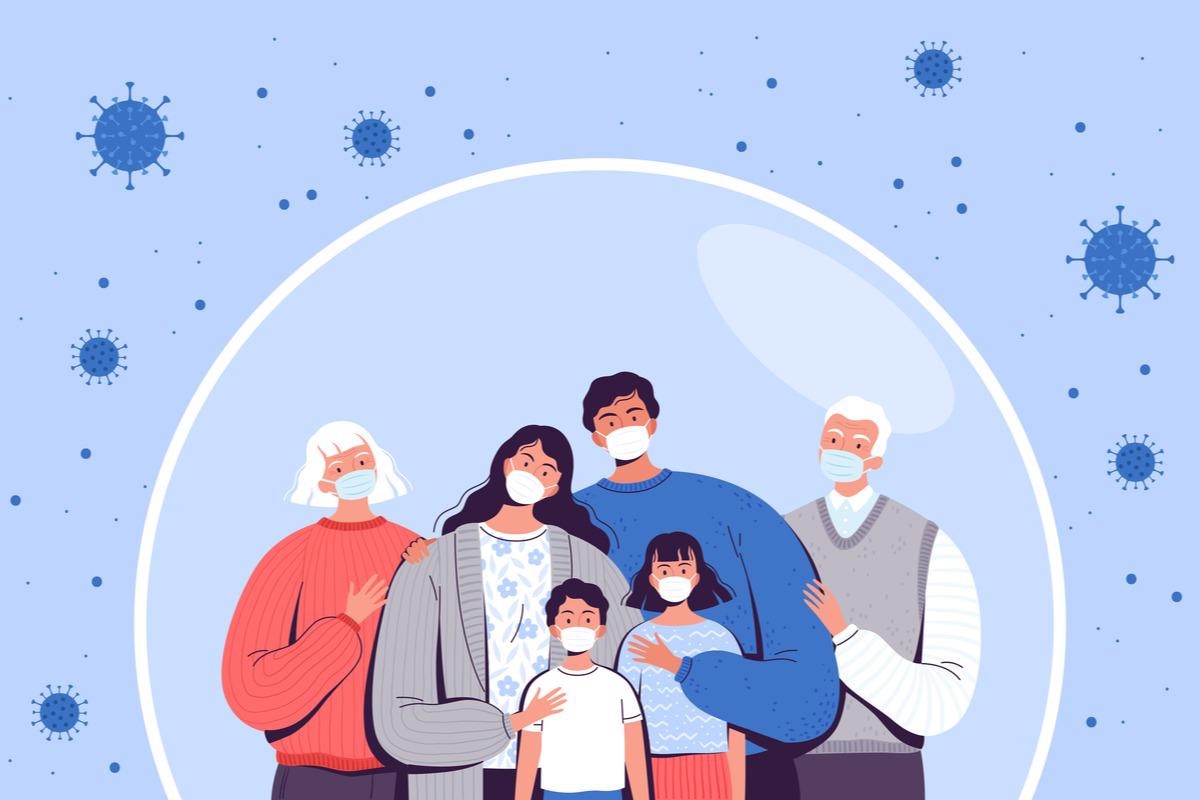Scientists have characterized severe acute respiratory syndrome coronavirus 2 (SARS-CoV-2) as a highly virulent and infectious virus. It is an RNA virus, which belongs to the family Coronaviridae and is the causal agent of the ongoing coronavirus disease 2019 (COVID-19) pandemic.
 Study: The role of multi-generational household clusters in COVID-19 in England. Image Credit: Oqvector/Shutterstock
Study: The role of multi-generational household clusters in COVID-19 in England. Image Credit: Oqvector/Shutterstock

 *Important notice: medRxiv publishes preliminary scientific reports that are not peer-reviewed and, therefore, should not be regarded as conclusive, guide clinical practice/health-related behavior, or treated as established information.
*Important notice: medRxiv publishes preliminary scientific reports that are not peer-reviewed and, therefore, should not be regarded as conclusive, guide clinical practice/health-related behavior, or treated as established information.
Background
Previous studies have claimed household transmission to be a high-risk route for infection and a potential contributor to COVID-19 incidence in the population. In England, researchers estimated the secondary attack rate to be 16%. In this country, the surge in the COVID-19 cases occurred in the summer of 2020, and this spike raised the question about the importance of settings in which the transmission occurred.
Many studies hypothesized that multi-generational households or multi-generational household clusters, which mostly consist of individuals of non-white ethnicities, played an important role in elevating the total number of COVID-19 cases.
Although the term “multi-generational households” has been consistently used in research as statistics in England, it does not have one single definition. One of the definitions is - three generations of adults living in a single household. A survey conducted in 2013-2014 recorded the existence of 1.8 million multi-generational households in the UK.
Another definition of multi-generational households is - households containing at least one individual from each age bracket, i.e., 0-19, 20-69, and above 70 years old. The Office for National Statistics (ONS) Annual Population Survey (APS) follows the above-mentioned definition and claims that multi-generational households are more prevalent among non-white ethnic households than white households.
Systematic collection and maintenance of data related to SARS-CoV-2 infection and the address of the infected person are conducted by the UK Health Security Agency (UKHSA) for communicable disease surveillance.
Scientists conducted new research using data from the UKHSA to characterize the COVID-19 outbreak in households in England. The research team aimed to validate a previous hypothesis on multi-generational households as a prime contributor to the overall number of COVID-19 cases during the Summer of 2020.
This research has been published on the medRxiv* preprint server.
The study
In this study, researchers used a cross-sectional design, and the COVID-19 cases were assigned to clusters if they occurred in the same household or residential property within a 14-day rolling window. Due to the lack of a pre-existing standard definition, this study defined multi-generational clusters as households with three or more cases. The distribution of cases should be such that one case is a person aged between 0 and 16 years, one case is an individual aged ≥ 60 years and another COVID-19 positive individual with at least 16 years between two members of each age group.
Main findings
In this study, a total of 3,647,063 COVID-19 cases were reported between the period of 1st April 2020 and 20th May 2021. Researchers estimated around 54% occurred in residential clusters. This study estimated the clusters of COVID-19, occurring in multi-generational households, to be 1.5%, and such clusters were mostly found in regions of greater population density and higher relative deprivation.
Interestingly, researchers reported that multi-generational clusters were more commonly found among households of non-white ethnicity and produced larger clusters than non-multi-generational clusters. These findings are in line with previous studies that reported greater local-area deprivation is associated with higher rates of SARS-CoV-2 infection. These studies have also indicated that the rate of infection was significantly higher among non-white ethnicities.
Scientists have shown that a minority of COVID-19 clusters occurred in multi-generational households and these households accounted for 2.7% of residential clusters. This result does not support the hypothesis formed in this study which believed multi-generational households significantly contributed to the COVID-19 peak in the Summer of 2020.
The findings of this study are not in line with a previously published review report by the UK government’s Scientific Advisory Group for Emergencies (SAGE) that claimed large or multi-generational households are significantly associated with a higher risk of transmission of COVID-19.
Researchers agree that there is an increased possibility of transmission of the SARS-CoV-2 virus within multi-generational households. Still, in the big picture context, this setting contributes a smaller number to the overall number of national cases. This is because the number of individuals living in multi-generational households is significantly low.
Some of the challenges faced by researchers
One of the challenges faced by the authors while conducting this study was the lack of a standard or consistent definition of multi-generational households. This resulted in the availability of differential data based on different definitions.
Another difficulty faced by the researchers was that they only obtained data for people who tested positive for COVID-19 and no other relevant information on the same household, e.g., the total number of people present in a household. This prevented the authors from estimating secondary infections.

 *Important notice: medRxiv publishes preliminary scientific reports that are not peer-reviewed and, therefore, should not be regarded as conclusive, guide clinical practice/health-related behavior, or treated as established information.
*Important notice: medRxiv publishes preliminary scientific reports that are not peer-reviewed and, therefore, should not be regarded as conclusive, guide clinical practice/health-related behavior, or treated as established information.